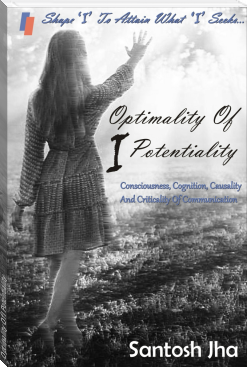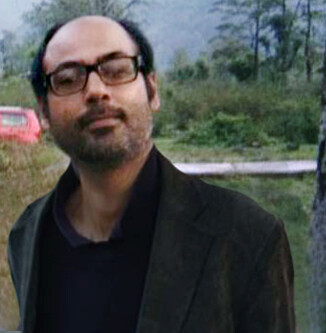Optimality Of I Potentiality, Santosh Jha [the false prince txt] 📗

- Author: Santosh Jha
Book online «Optimality Of I Potentiality, Santosh Jha [the false prince txt] 📗». Author Santosh Jha
To internalize the idea and utility of ‘Mortality’, we need to put aside our consciousness, which is so used to popular modern ideas and benchmarks. It is a popular way of thinking that death is the end. Classical spiritual philosophy accepted it as the beginning of life. The core Indian philosophy starts with finality as the initiation of all ideas of life. That is why it is self-evident and self-corroborative. Our worthy ancestors could decipher that even in the definitive and inevitable pattern of mortality; there was overall continuity and immortality, which permeated in the milieus around them. They could decipher that in nature, there were elements, which remained continuous and immortal in totality, even while part of it decayed in cyclic mechanism.
This masterly observation was made available to the genius of imagination and it could be unraveled to them that every life on earth too had core elements, which were continuous and immortal, even when part of it decayed in time. This core observation engendered the idea of two distinct but simultaneous elements of the cosmic realism – the mortal and discontinuous and; the immortal and continuous. They also discovered that within human life too, the same twin elements existed. The body was mortal and aligned to discontinuous cosmic elements but the elemental consciousness deep within was immortal and aligned with continuous elements.
The subjective feeling of me, the self as distinct and different from other human being was just a virtual bridge between the twin realisms of mortality and immortality. This core idea became the cornerstone of a philosophy, which is enshrined in the cardinal Indian spiritual system. The yoga philosophy also adheres to this core idea. Yoga in ancient Indian language of Sanskrit means union of the immortal elements within a human being with the cosmic elements of immortality. Yoga is a process of attaining the union of jeevatma (the soul of living beings) with parmatma (the ultimate soul). This core idea also led to a belief-system, which decided the ultimate utility and purpose of all lives. Yogic philosophy presents a self-evident and self-corroborative idea of why and what is the true way of living one’s life.
The core idea was tested empirically in the social milieu. The best laboratory to test and validate any idea empirically is the human body-mind mechanism itself. The patterns of human action and behavior corroborated the idea and they finally became a social practice and part of the larger culture of that time. The culture this core idea evolved, accepted that in life, everyone is naturally inclined to maximize joys and minimize pains. It was accepted that self-welfare is the cardinal goal of life for every living being and this is attainable through self-interface or self-dialogue (aatma-sakchhatkar).
The wise of our civilization empirically observed that living beings are in constant and causative relationship with elements of nature. This nature also exists in microcosmic form within living beings. In nature, there are both mortal and immortal elements. They observed that mortal elements are usually expressed in tangible matter and immortal ones in intangible form. They deciphered that human being could attain their lasting and continuous wellness only when they establish a relationship with immortal and intangible elements of nature and life. The philosophy they engendered says – True And Lasting Relationship Can Happen Only Between Similar And Generic Elements.
This is the idea, yogic philosophy practices in totality and perfection. Yogic philosophy maintains that even the matter shall finally lead to a-matter, tangible shall lead to intangible and mortal elements shall lead to immortal elements. This is because, empirically, true and lasting relationship can happen only between similar and generic elements. The five senses of body mechanism shall initially orient a person to consumption and gratification. However, the same five senses automatically and finally leads to the realization that these consumptions and gratifications are ephemeral and mortal.
This is self-evident and self-corroborative as every human knows that mortality is inevitable and the ultimate realism. Yogic philosophy admits it as self-evident for all that all pleasures of body and all joys of gratifications have the inbuilt and inherent energy advocating against it. The energies of attachments and gratifications are entwined with the inverse energies of detachment and renunciation. That is why, within a human being, the desire and will to have a life of absolute detachment and renunciation is as powerful as the desire and will for a life of attachment and gratification. The philosophy, which enshrines the ideals of purpose of life as attainment of perpetuity of wellness, therefore extends this empirically self-evident and self-corroborative fact. It says that every human being should consciously opt for a relationship with only the intangibly expressed continuous and immortal elements of nature, both within the nature of the body-mind consciousness as well as the nature outside in physically and tangibly expressed domain. It says that anyone can decipher the practical realism that the flow of energy of gratification is also joyous but it ends up in the finality of pain and emptiness. Whereas, the energy flow of detached consciousness keeps augmenting like a flame in the fireplace, which is self-energized by constant offering of renounced elements of consciousness.
There is this very pragmatic and self-evident realism that the powerful energy of joy in consumption and gratification is entwined with its end in pain and discontinuity. There is this famous metaphor of equating it with the joy of itching. It starts with so much pleasure when we scratch an itch. If we continue with it, it finally ends up in sharp pain and even bleeding in very short time. The idea is that the very core and perennial realization of painful mortality and regret of any gratification joy, even while we are at the peak of its enjoyment is there from the very start. The fruit of gratification has seeds of pain and regret of its inevitable discontinuity loaded within it.
Yogic philosophy lists three broad types of grief and pain for humans. As it is the essential nature of a tangible gratification element, the person who starts enjoying it has this grief and pain well on in his or her mind that this joy shall finally land him or her in trouble. It is in fact instantaneous. People globally know that more people are dying because of overeating and overindulgence. The moment you overeat, you start feeling uneasy. As is human instinct, there is also a sense of guilt after the action, which we happily ignore but it is stored in the subconscious. This is first type of grief.
The second grief emanates out of the mortality and discontinuity of the very element of tangible gratification. If I have million dollars, I am always stressed and in perpetual consternation that this money I may lose in business or in other way. Worse, the moneys may be robbed or authorities may take it away as tax. Worst enough; I am also unhappy that my neighbor probably has more wealth and better prospect of being wealthier than me.
The third grief is that when I have once got the taste of a particular gratification, it is stored in my memory and subconscious mind. When finally the gratification is no more available to me, its memory becomes an excruciating source of grief and pain.
So, what we are trying to arrive at by mentioning this idea about ‘I-Mortality’, which classical spiritual philosophy has documented well, is a ‘causality’ between tangible and intangible. We have already talked about how consciousness itself has this dialectic energy of entropy-expansion leading to entropy-suppression. This idea of ‘I-Mortality’ emphasizes the reality that as mortality is entrenched deep in our subconscious mind states, this unleashes ‘Causalities’ in our conscious state. What we require to do is consciously re-design and ‘re-shape’ this ‘I-Mortality’ element to help us remain in stable and sustained homeostatic equilibrium, physically, emotionally, intellectually, psychologically and spiritually.
*****
Accept My Gratitude
Writing something is a daunting task as there is always a lurking apprehension of it not being of utility for some readers. I however feel at ease, because of my faith in magnanimity of readers. I am happily sure; you shall forgive if my efforts could not be up to your expectations. Thank you so much for being with me and allowing me to share with you. Wish you an empowered life; with the prosperity of the consciousness.
***
About The Author

People say, what conspire to make you what you finally become are always behind the veil of intangibility. Someone called it ‘Intangible-Affectors’. Inquisitiveness was the soil, I was born with and the seeds, these intangible-affectors planted in me made me somewhat analytical. My long stint in media, in different capacities as journalist, as brand professional and strategic planning, conspired too! However, I must say it with all innocence at my behest that the chief conspirators of my making have been the loads of beautiful and multi-dimensional people, who traversed along me, in my life journey so far. The mutuality and innocence of love and compassion always prevailed and magically worked as the catalyst in my learning and most importantly, unlearning from these people. Unconsciously, these amazing people also worked out to be the live theatres of my experiments with my life’s scripts. I, sharing with you as a writer, is essentially my very modest way to express my gratitude for all of them. In my stupidities is my innocence of love for all my beautifully worthy conspirators!
**
Other Titles By Santosh Jha
Related eBooks

Fiction

Non-Fiction

Do Write To Me.
sjwrite@gmail.com
ImprintPublication Date: 08-28-2021
All Rights Reserved





Comments (0)